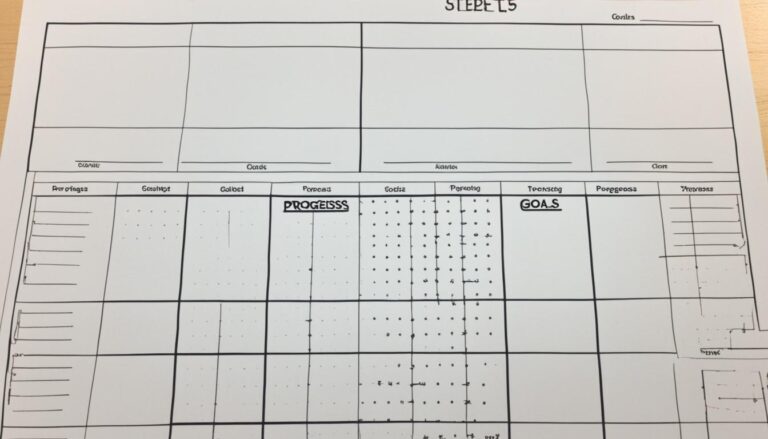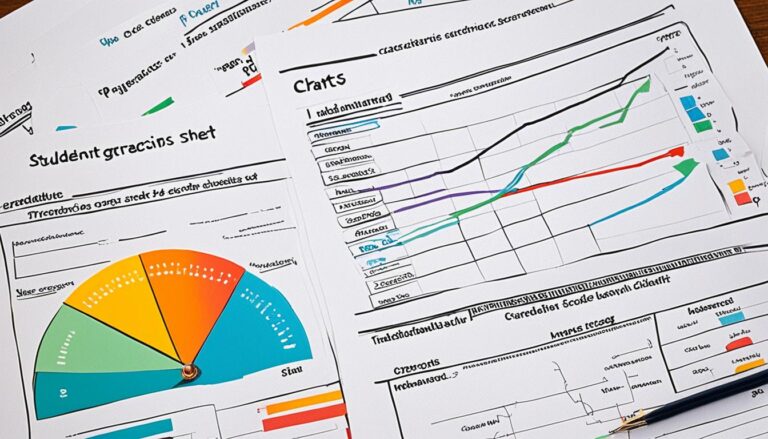Unlock Prosperity: Why Using a Budget Is Beneficial

Have you ever wondered why some businesses thrive while others struggle to stay afloat? What sets them apart and propels them towards success? The answer lies in one fundamental practice – budgeting. Yes, you heard it right. Budgeting is the key to unlocking prosperity and setting your business on the path to growth and profitability.
Many people underestimate the power of budgeting or dismiss it as a tedious and unnecessary task. But the truth is, using a budget can bring tremendous benefits to your business, regardless of its size or industry. It enables you to allocate resources effectively, plan for the future strategically, and make informed decisions that drive success.
Key Takeaways:
- Budgeting is not just for big corporations; it is beneficial for businesses of all sizes and industries.
- Using a budget helps control expenses, improve cash flow, and increase profitability.
- By budgeting, businesses can anticipate and prepare for future challenges, ensuring long-term success.
- Budgeting fosters accountability and transparency, promoting a culture of responsibility and ownership.
- Make budgeting a priority and unlock the door to prosperity for your business.
The Importance of Budgeting for Businesses
Budgeting is a crucial tool for businesses of all sizes, providing them with the means to allocate resources, plan for the future, and make informed decisions that drive growth and profitability. By implementing effective budgeting strategies, businesses can experience several key benefits and advantages.
Benefits of Budgeting
There are numerous benefits to implementing budgeting practices within your business. Let’s explore the advantages below:
- Financial Control: Budgeting allows you to have better control over your business’s finances by providing a clear and organized overview of income and expenses. This control enables you to identify areas where costs can be reduced and resources can be better utilized, ultimately leading to improved profitability and cash flow.
- Resource Allocation: Budgeting helps you allocate resources effectively by determining where and how much to invest in various aspects of your business, such as marketing, operations, and employee development. This ensures that resources are utilized in a way that aligns with your business goals and maximizes returns on investment.
- Future Planning: By creating a budget, you gain the ability to plan for the future and set realistic goals for your business. This includes forecasting revenue, identifying potential expenses, and predicting cash flow fluctuations. Having a clear roadmap allows you to make informed decisions, adapt to changing market conditions, and be better prepared for both opportunities and challenges that lie ahead.
- Performance Evaluation: Budgeting provides a benchmark against which you can measure your business’s performance. By comparing actual results to the budgeted expectations, you can identify areas of strength and weakness, analyze trends, and make necessary adjustments to ensure ongoing success.
- Transparency and Accountability: Implementing a budgeting process fosters a culture of transparency and accountability within your organization. It encourages open communication, as employees are aware of the financial goals and objectives outlined in the budget. This transparency promotes a sense of ownership and responsibility, motivating individuals to contribute to the overall success of the business.
In summary, budgeting plays a critical role in the success of businesses by enabling financial control, effective resource allocation, future planning, performance evaluation, and transparency. By harnessing the advantages of budgeting, you can position your business for long-term success and achieve your financial goals.

| Advantages of Budgeting | |
|---|---|
| Financial Control | Resource Allocation |
| Future Planning | Performance Evaluation |
| Transparency and Accountability |
Controlling Expenses: How Budgeting Helps Businesses Monitor Spending and Improve Cash Flow
One of the most significant advantages of budgeting is the ability to track and control expenses. By setting a budget for each department or area of the business, management can monitor spending and ensure that resources are being used efficiently. This level of control enables businesses to identify areas of overspending and implement cost-saving measures where necessary.
When businesses actively monitor spending through budgeting, they can make informed decisions about resource allocation. By comparing actual spending against budgeted amounts, businesses can identify variances and take corrective actions to improve cash flow. This real-time visibility allows management to address any issues promptly, ensuring that financial resources are optimized and wasteful spending is minimized.
Moreover, budgeting facilitates a culture of cost consciousness throughout the organization. By involving employees in the budgeting process and promoting financial transparency, businesses can create a sense of accountability and responsibility in managing expenses. This approach encourages employees to take ownership of their spending decisions, making them more mindful of how their actions impact the overall financial health of the company.
By effectively controlling expenses and improving cash flow through budgeting, businesses can achieve significant cost savings and ultimately drive higher profits. A well-managed budget ensures that financial resources are used efficiently, eliminating unnecessary expenses and allowing for strategic investments that can contribute to business growth and profitability.
Benefits of Controlling Expenses Through Budgeting
- Identify areas of overspending and implement cost-saving measures.
- Make informed decisions about resource allocation.
- Improve cash flow by addressing variances in actual spending.
- Create a culture of cost consciousness and financial responsibility.
- Maximize financial resources and make strategic investments.

With effective expense control and improved cash flow, businesses can achieve cost savings and drive higher profits. By leveraging the power of budgeting, businesses can optimize their financial resources, make informed decisions, and position themselves for long-term success.
Planning for the Future: How Budgeting Helps Businesses Anticipate and Prepare for Challenges
Strategic planning is essential for long-term success in any business. By incorporating budgeting into the strategic planning process, businesses can effectively anticipate and prepare for future challenges. Budgeting allows management to analyze historical data and market trends, providing valuable insights that guide decision-making and resource allocation.
Anticipating challenges is a key aspect of strategic planning. By understanding industry trends and potential obstacles, businesses can proactively develop strategies to navigate these challenges. Budgeting plays a crucial role in this process, as it enables businesses to forecast revenue and expenses based on historical performance and market conditions.
By utilizing budgeting techniques such as variance analysis, businesses can identify areas of potential risk and take proactive measures to mitigate them. For example, if historical data indicates a decrease in sales during a specific season, management can allocate resources wisely, adjust marketing strategies, and implement cost-saving measures to weather the anticipated downturn.
Budgeting also promotes flexibility and adaptability. A well-crafted budget allows businesses to allocate resources effectively, ensuring that they are prepared to tackle unexpected challenges. By having a clear understanding of their financial position, businesses can make informed decisions and quickly pivot when necessary.
Moreover, budgeting fosters communication and collaboration within an organization. When all departments are involved in the budgeting process, it creates a sense of ownership and accountability. By aligning goals and objectives across teams, businesses can foster a culture of collaboration and responsibility, which is crucial for long-term success.
To illustrate the benefits of budgeting in planning for future challenges, consider the following table:
| Challenges | Anticipated Impact | Budgeting Strategies |
|---|---|---|
| New regulatory compliance requirements | Potential increase in operating costs and compliance penalties | Allocate budget for training, hire compliance personnel, implement systems to track and report compliance |
| Economic downturn | Potential decrease in sales and cash flow | Implement cost-saving measures, diversify revenue streams, adjust marketing and pricing strategies |
| Emerging competitor in the market | Potential loss in market share and decrease in customer base | Allocate budget for market research, product innovation, and marketing campaigns to maintain competitiveness |

As demonstrated in the table, budgeting strategies can be tailored to address specific challenges. By allocating resources and developing action plans, businesses can proactively prepare for and overcome obstacles that may arise in the future.
In conclusion, budgeting is a powerful tool that enables businesses to plan for the future, anticipate challenges, and prepare strategic responses. By incorporating budgeting into their strategic planning process, businesses can position themselves for long-term success in an ever-changing and competitive business landscape.
Fostering Accountability and Transparency: How Budgeting Promotes a Culture of Responsibility and Ownership
In addition to financial planning, budgeting plays a crucial role in fostering accountability and transparency within your organization. By involving all stakeholders in the budgeting process, from department heads to frontline employees, you can create a culture of responsibility and ownership that drives your business forward.
When everyone is included in the budgeting process, they develop a vested interest in achieving the agreed-upon goals. This sense of ownership boosts motivation and encourages individuals to work collaboratively towards common objectives. By aligning everyone’s efforts, you cultivate a culture that values accountability and a spirit of responsibility.
Regularly reviewing and reporting on budget performance further enhances accountability and transparency. By ensuring that everyone is on the same page, you can make timely adjustments and address any challenges or opportunities that arise. This open and collaborative environment leads to improved communication among team members, helping to foster a sense of trust and shared goals.
Ultimately, the promotion of accountability and transparency through budgeting leads to better business outcomes. By fostering a culture where everyone takes ownership of their responsibilities, you create an environment that encourages innovation, sound decision-making, and continuous improvement. This, in turn, drives efficiency, productivity, and profitability, positioning your organization for long-term success in today’s competitive market.






